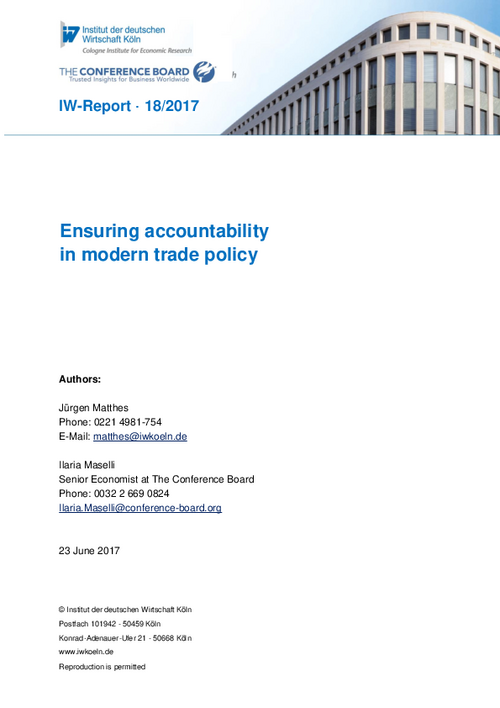Attempts to foster trade liberalisation with a new generation of trade agreements aimed at lowering non-tariff barriers face opposition among the general public. Many fear that trade liberalisation risks lowering the level of protection embedded in regulations that are aimed at safeguarding social rights, health and the environment.

Ensuring accountability in modern trade policy
IW-Report

Attempts to foster trade liberalisation with a new generation of trade agreements aimed at lowering non-tariff barriers face opposition among the general public. Many fear that trade liberalisation risks lowering the level of protection embedded in regulations that are aimed at safeguarding social rights, health and the environment.
Such criticism cannot be ignored. As we argue in this paper, by clarifying its view on this issue, the EU can further strengthen the position in fora like the G7 and the G20 where the topic of trade is currently under discussion. But along which lines? Regulatory cooperation, in the context of the new generation of trade agreements, is promising, reasonable and controllable. If done correctly, regulatory cooperation will benefit consumers and not threaten consumer protection. However, a regulatory cooperation body needs transparency and a set of rules to be fully accountable to EU citizens.
Looking at the way the same issue was dealt with in the context of monetary policy and independent central banks, we propose a mix of provisions that aim at defining a clear mandate, enforcing transparency of operations and establishing a reputation.

Jürgen Matthes / Ilaria Maselli: Ensuring accountability in modern trade policy
IW-Report


Wer folgt auf Biden? "Trump denkt rein national"
Deutschland und die EU sind auf eine zweite Amtszeit von Donald Trump nicht vorbereitet. Im Handelsblatt-Podcast "Economic Challenges" diskutieren IW-Direktor Michael Hüther und Bert Rürup die drohenden geopolitischen Folgen – und was sie für die Wirtschaft ...
IW
Trump oder Harris oder …? Worauf sich Europa einstellen muss
Wenige Monate vor der Präsidentschaftswahl in den USA hat Donald Trump gute Chancen auf eine Wiederwahl. Auf Seiten der Demokraten hat der amtierende Präsident seine Kandidatur nach langem Zögern zurückgezogen, Vizepräsidentin Kamala Harris wird mit hoher ...
IW